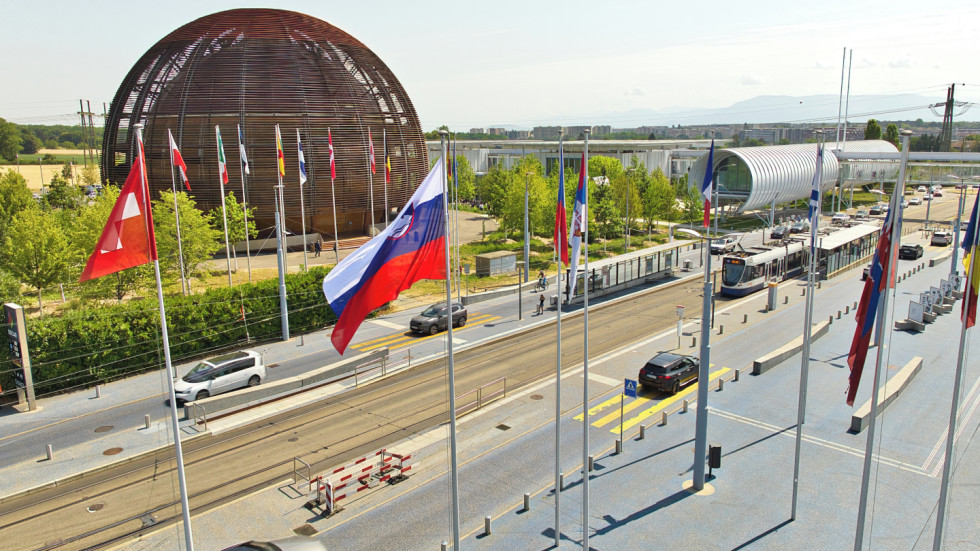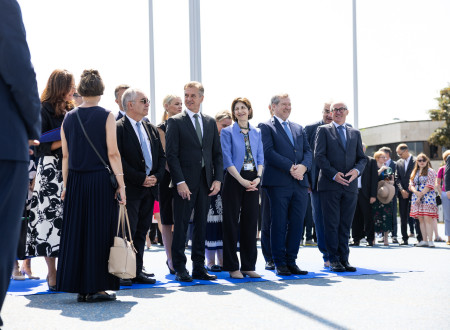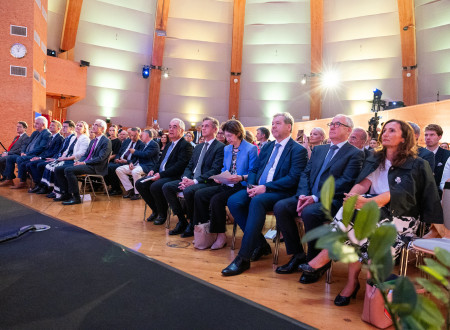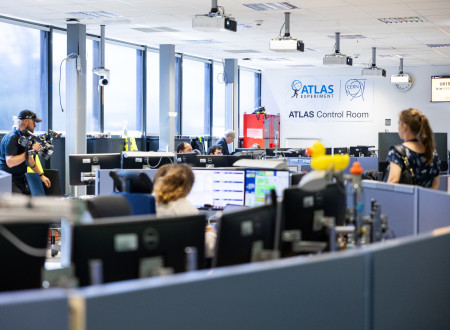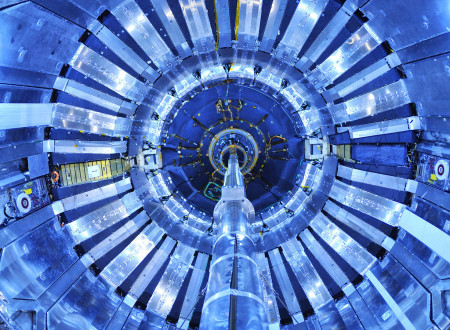Slovenian flag flown in front of CERN
Slovenia became the 25th full member of CERN on 21 June 2025. As full membership is a great honour, CERN marks the entry of each new member with a ceremony in which the national flag is flown. Among others, the ceremony was attended by Slovenian Prime Minister, Robert Golob, Minister of Higher Education, Science and Innovation, Igor Papič, State Secretary for Science and Innovation and member of the CERN Council, Jure Gašparič, and Ambassador to Geneva, Anita Pipan. Other guests included representatives of higher education and scientific research institutions, the business community and politics.
"CERN is an excellent example of scientific cooperation across borders, and Slovenia has become part of this community," said CERN Director-General Fabiola Gianotti at the ceremony. The President of the CERN Council, Costas Fountas, welcomed the new full member in Slovenian: “Slovenija, dobrodošla v Cern!” (“Slovenia, welcome to CERN!”) He recalled the historical and current significance of CERN: "The scientific infrastructure and community were severely damaged during the Second World War. Scientists were moving out of Europe. However, a group of visionaries emerged who set themselves the goal of making Europe a scientific superpower once again, guided by science for peace. The year 1954 saw the foundation of CERN, which quickly became one of the most prestigious scientific research institutions in the world."
The importance of science for peace was also highlighted by Prime Minister Robert Golob: "Slovenia is joining CERN at a sensitive time. I believe that science is important for peace, which is why we must choose knowledge and invest in it. Knowledge connects rather than divides, which is why our country invests in it. We often hear that Europe is lagging behind, but standing here today, I can see that this is not the case. Slovenia is committed to supporting CERN, not only because you deserve our support, but also because we, as Europeans, need CERN."
CERN values Slovenia's knowledge
As part of their visit to CERN, Prime Minister Golob, Minister Papič, State Secretary Gašparič and Ambassador Pipan viewed the ATLAS experiment. The experiment is proof that CERN greatly values and trusts Slovenian knowledge. This March, Andrej Gorišek from the Jožef Stefan Institute assumed the position of head coordinator of the ATLAS detector at the Large Hadron Collider – currently the leading CERN instrument. ATLAS is the largest of four detectors used to investigate the basic building blocks of nature and thus the universe, as part of the Large Hadron Collider.
The ceremony marking Slovenia's full membership of CERN was a unique opportunity for all Slovenians working with this prestigious international scientific research organisation to gather in Geneva. They were met by Prime Minister Golob, Minister Papič and State Secretary Gašparič, who congratulated them on their outstanding scientific and research work and their contribution to strengthening the international reputation of Slovenian science and the country itself. On this occasion, Minister Igor Papič emphasised: "We would not be here today as full members if it were not for our main users of the CERN infrastructure. These are our physicists who have worked with CERN for decades. An increasing number of Slovenian companies are also interested in cooperating with CERN, so full membership is an opportunity to continue and build on Slovenia's extremely successful story at CERN."
All 25 full members of CERN are completely equal
Although Slovenian scientists and some Slovenian companies have worked with CERN for decades, certain restrictions have applied to both scientific and economic cooperation to date. Full membership has put an end to such restrictions.
Full membership means, among other things, that:
- Slovenia has become co-owner of the CERN infrastructure, one of the most important scientific research infrastructures in the world;
- Slovenia has obtained voting rights in the CERN Council, the highest decision-making body, where the votes of all 25 full members are equal;
- Slovenian scientists have been granted unlimited access to research projects;
- Slovenian companies have gained unlimited access to CERN's technological projects and tenders.
Or, as the President of the CERN Council Fountas succinctly summarised the significance of full membership: "Slovenia has come to CERN, and CERN has come to Slovenia. CERN has become Slovenia's laboratory."


